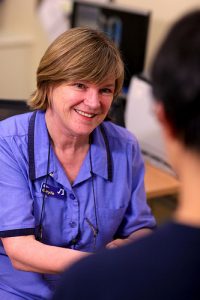
The question of whether nurse practitioners should be allowed to practice independently is being debated in Nebraska.
Many nurse practitioners argue that there are many benefits to being able to work without physician oversight. Meanwhile, many physicians are concerned that nurses are “trying to get by legislation what physicians earned with education,” as a doctor says in this article in the Omaha World-Herald.
Sixteen states have laws that allow nurse practitioners to work independently. Nebraska is not one of them.
Nurse practitioners are being called upon more and more as the population ages, as federal law gives more people access to care, and as the number of doctors grows more slowly than demand. They are able to deal with many common medical complaints because of their training and experience. If they encounter something they can’t deal with, they can make a referral to a specialist. And in areas that lack an adequate number of doctors, nurse practitioners can provide better access to health care and shorter waits.
But some physicians are saying that independence for nurse practitioners could compromise quality. They emphasize that physicians have more years of education and training.
In North Platte, Dr. Michael Trierweiler and nurse practitioner Kelley Hasenauer became full business partners in a new clinic begun last month. The business arrangement, the two say, appears to be the only one of its kind in Nebraska.
Trierweiler and Hasenauer had worked together before in North Platte, and Hasenauer obtained her doctorate of nursing practice in Kansas City, Mo., last year. She also worked briefly as a faculty member at the University of Nebraska Medical Center. Although Trierweiler will be her collaborating physician, he said there will be cases on which he consults her, too. He said he respects what she brings to the clinic.
The controversy over independence for nurse practitioners isn’t as intense in western Nebraska, he said, because the shortage of primary care providers there is severe.
A lobbyist for the Nebraska Nurse Practitioners Association said she expects the association to push for independence next year.
“It remains our top legislative goal,” Cora Micek said.
The Nebraska Medical Association will resist that effort. Dr. Richard Blatny Sr., chairman of the association’s commission on legislation, said it’s inappropriate for nurse practitioners to seek independence at a time when experts are calling for partnerships and teamwork through the “medical home” initiative and other concepts.
Blatny, of Fairbury, Neb., and Gregorius said they have patient safety concerns about nurse practitioners working independently.
“Nursing plays a very, very important part in health care,” Gregorius said. “We couldn’t do without them.” But getting a master’s degree or doctorate over two or three years, he said, doesn’t compare to four years of medical school, four years in residency training and frequently more time in specialty training.
“I’m sorry. The basis is not there. It’s not,” he said of nurse practitioners working autonomously. “Their basis is nursing, not medicine.”
Studies done from 1990 to 2008 of the quality of care given by nurse practitioners and other advanced practice nurses, such as certified nurse midwives, were reviewed last year by a panel for “Nursing Economics.” The panel reported that those nurses “provide effective and high-quality patient care (and) have an important role in improving the quality of patient care in the United States …”
Some of the nurse practitioners in the dozens of studies practiced independently and some collaboratively, said Robin Newhouse, a professor in the University of Maryland School of Nursing. Newhouse was the lead author in the report.
National physician organizations generally agree that a primary-care shortage exists and will worsen as baby boomers grow old.
Dr. Glen Stream, president of the American Academy of Family Physicians, said nurse practitioners can help fill the gap. But the Spokane, Wash., doctor and his organization argue it should be done in a collaborative role with physicians.
He predicted the question of autonomy won’t go away. “My opinion is, it’s going to get to be a bigger issue,” Stream said.
Sixteen states grant independence to nurse practitioners, including Iowa, Wyoming and Colorado.
Meanwhile, huge numbers of nurse practitioners are pouring out of colleges. About 155,000 now practice in the United States, up from 82,000 in 2001.
From 2001 through 2010, the numbers of nurse practitioners more than doubled to 893 in Nebraska, and practically doubled to 1,197 in Iowa, according to the American Academy of Nurse Practitioners.
The number of physician assistants, who work with physicians in a somewhat similar manner to nurse practitioners, also has risen. Some 83,000 practiced in 2010, up from 40,000 in 2000, according to the American Academy of Physician Assistants.
Patricia Clinton, an assistant dean at the University of Iowa College of Nursing, said nurse practitioners will continue to fight for the right to practice independently.
“This is not a new battle,” Clinton said. “We are not trying to practice anything more than we are educated and clinically trained to do.”
